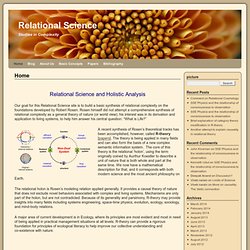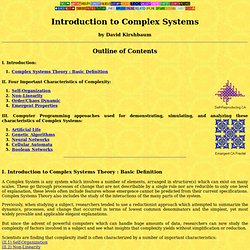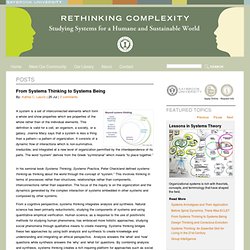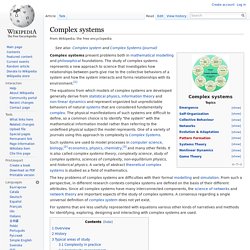

Studies in Complexity. Home Relational Science and Holistic Analysis Our goal for this Relational Science site is to build a basic synthesis of relational complexity on the foundations developed by Robert Rosen.

Rosen himself did not attempt a comprehensive synthesis of relational complexity as a general theory of nature (or world view); his interest was in its derivation and application to living systems, to help him answer his central question: “What is Life?” A recent synthesis of Rosen’s theoretical tracks has been accomplished, however, called R-theory [papers]. The theory is being applied in many fields and can also form the basis of a new complex semantic information system. The relational holon is Rosen’s modeling relation applied generally. A major area of current development is in Ecology, where its principles are most evident and most in need of being applied in practical management situations at all levels.
Introduction to Complex Systems. By David Kirshbaum I.

Introduction: Complex Systems Theory : Basic Definition II. Four Important Characteristics of Complexity: III. I. A Complex System is any system which involves a number of elements, arranged in structure(s) which can exist on many scales. Previously, when studying a subject, researchers tended to use a reductionist approach which attempted to summarize the dynamics, processes, and change that occurred in terms of lowest common denominators and the simplest, yet most widely provable and applicable elegant explanations. But since the advent of powerful computers which can handle huge amounts of data, researchers can now study the complexity of factors involved in a subject and see what insights that complexity yields without simplification or reduction. Scientists are finding that complexity itself is often characterized by a number of important characteristics: (II.1) Self-Organization(II.2) Non-Linearity(II.3) Order/Chaos Dynamic(II.4) Emergent Properties.
Examples. High speed rail 2: a day in the life of Britain's new rail network animated. From Systems Thinking to Systems Being. A system is a set of interconnected elements which form a whole and show properties which are properties of the whole rather than of the individual elements.

This definition is valid for a cell, an organism, a society, or a galaxy. Joanna Macy says that a system is less a thing than a pattern—a pattern of organization. It consists of a dynamic flow of interactions which is non-summative, irreducible, and integrated at a new level of organization permitted by the interdependence of its parts. The word “system” derives from the Greek “synhistanai” which means “to place together.” Les documents par thème. Home-fr. Rhône Alpes Complex Systems Institute. Appréhender la complexité. Suite à ma petite sortie sur l'entreprise 2.0, beaucoup de choses très instructives se sont déroulées.

Qu'il me soit permis de remercier les abonnés du flux ainsi que les "Re-Twitters" qui m'ont permis de multiplier par 25 l'audience de ce modeste blog, notamment Anthony Poncier pour le RT initial, et Thierry de Baillon (dont je comprend la revendication druckerienne, pensant effectivement que les idées de ce grand monsieur de l'entreprise moderne ne sont pas assez diffusées, et que je remercie également de parler autant de moi en mal là aussi sur Twitter !). Parlant de choses instructives, je pense avant tout aux différentes remarques sur les justifications théoriques de la collaboration, dont beaucoup se réfèrent à un papier de D.J.
Snowden dans la HBR de Novembre 2007. 1) Une approche de la complexité Commençons par le papier 'étendu'. 1. 2) Le framework opérationnel 3) Les remarques et interrogations Papiers cités Snowden D.J., P. Quelques aspects sur la complexité. L’émergence de la complexité dans l’histoire de la science. “Intégrer la Complexité est la Clé du Progrès” Complex systems. Complex systems present problems both in mathematical modelling and philosophical foundations.

The study of complex systems represents a new approach to science that investigates how relationships between parts give rise to the collective behaviors of a system and how the system interacts and forms relationships with its environment.[1] Such systems are used to model processes in computer science, biology,[2] economics, physics, chemistry,[3] and many other fields. It is also called complex systems theory, complexity science, study of complex systems, sciences of complexity, non-equilibrium physics, and historical physics.
A variety of abstract theoretical complex systems is studied as a field of mathematics. The key problems of complex systems are difficulties with their formal modelling and simulation. Overview[edit] History[edit] Système complexe. Un article de Wikipédia, l'encyclopédie libre.

Ainsi une réaction chimique, comme la dissolution d'un grain de sucre dans du café, est simple car on connaît à l'avance le résultat : quelques équations permettent non seulement de décrire les processus d’évolution, mais les états futurs ou final du système. Il n'est pas nécessaire d'assister au phénomène concret ou de réaliser une expérience pour savoir ce qui va se résulter en réalité. Au contraire, les cellules nerveuses de notre cerveau, une colonie de fourmis ou les agents qui peuplent un marché économique sont autant de systèmes complexes car le seul moyen de connaître l'évolution du système est de faire l'expérience, éventuellement sur un modèle réduit.
En d'autre termes, lorsque l'on veut modéliser un système, on conçoit un certain nombre de règles d'évolution, puis l'on simule le système en itérant ces règles jusqu'à obtenir un résultat structuré. Complex Systems.